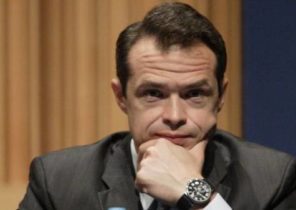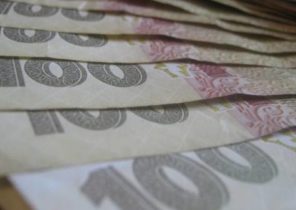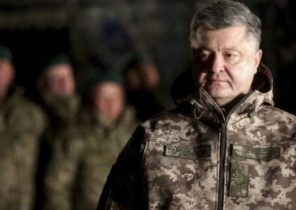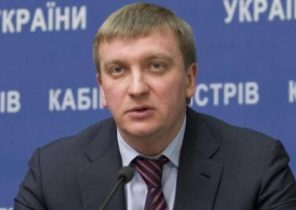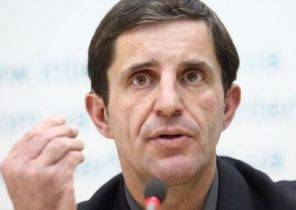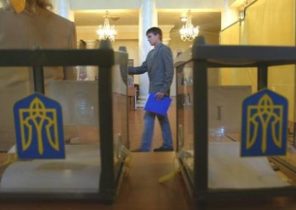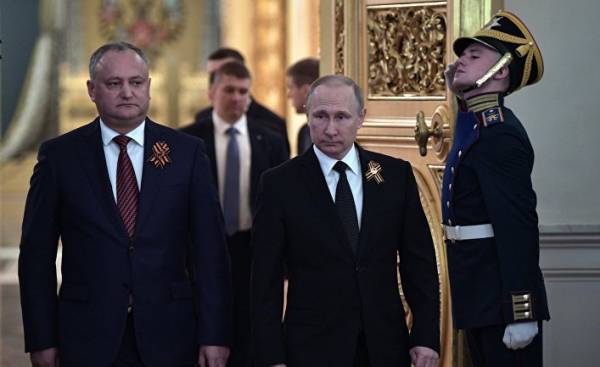
The invitation of Igor Dodon in the May 9 Victory day parade was the culmination of the attention Vladimir Putin has Moldovan President after his election in November last year. Between the leaders has already held two meetings, one official in January and one in March working.
Immediately there were significant results: first, the citizens of Moldova who have violated Russian migration law, got the opportunity to 12 may of this year to pass Amnesty (for the Dodon, it took no less than 10 thousand Moldovans). A decision was clearly taken personally by President Putin (as in the case of Amnesty for citizens of Tajikistan), with the traditionally skeptical attitude on the part of the Russian law enforcement authorities who did not undertake awareness-raising campaign, and not immediately ensured the smooth passage of the necessary procedures, especially in the regions of Russia.
Secondly, there is a symbolic breakthrough in trade-economic sphere: after a full ban in 2013 on the Russian market back wine Moldova state company “Cricova”. Until now, these political exclusions were made only for wines from Transnistria and Gagauzia.
Third, largely on the initiative of the Russian Dodon was invited to a meeting of the Supreme Eurasian economic Council in April and Moldova, after the adoption of the corresponding regulations of the Eurasian economic Union was promised the status of observer. Do not forget about the large-scale informational support that Moscow provides to the Moldovan President, he regularly gives large interview the key Russian state media and its activities are actively illuminated them in a positive way.
The balance of power
At first glance, the situation looks so that Russia comes to the old rake, but supports in the neighboring countries of any one political leader who seems most understandable, hoping to negotiate with him about the exclusive “strategic partnership”. Key elements of such partnership in the case of Moldova, many consider the country’s accession to the EAEU at the actual refusal from the Association with the European Union, and Union with Transnistria on the principles of asymmetric Federation model proposed in the framework of the Kozak Memorandum in 2003.
However, if you look at the actions of Russia in the Moldovan direction, it is possible to conclude that Moscow has set a more realistic goal, knowing their capabilities, which in recent years has drastically declined. Today it is impossible to say that Moldova continues to play politics swings like in the years 2001-2009 under President Voronin, who approached it with Russia, with the West. Today Moldova is increasingly incorporated in external orbit integration of the European Union. And it’s not just about symbolic of visa liberalization, which for Moldovans is not so relevant, because many of them have Romanian citizenship.
First, since 2009, Moldova, regularly suffering from internal shocks, such as the theft of the century for $1 billion, is increasingly dependent on financial support from institutions and individual EU countries, especially Romania, and the United States. This assistance (in the form of grants and concessional loans) is about 300-400 million euros per year and is on target macro stabilization, development projects and so on. There is no signal, for example, that Russia is ready to take on this financial burden.
Second, although the Moldovan political class seriously discredited the European idea, to say that it has lost its influence, can hardly be. Though it is worth remembering that the results of the second round of the presidential election Maia Sandu, the joint candidate of the right-wing Pro-European parties, which is not a special charisma and is more a technocrat, scored almost 50% of the votes.
That is discredited was not Pro-European idea as such, but the political forces which ruled the country since 2009. And if we talk about the voters of Dodona, it is not only traditional electorate nostalgic for the Soviet Union or just connected their lives with Russia, working or studying here, but the protest (not necessarily Pro) electorate, just disappointed in the current Pro-European government.
Pro-European sentiment is also fuelled by the fears of Russia, which increased dramatically with the beginning of the Ukrainian crisis. The Transnistrian conflict is still not resolved, which allows local politicians to speculate on the “Russian threat”. According to surveys, about 70% of citizens of Moldova are not only against the independence of Transnistria or the federalization of the country, but also against granting any form of autonomy to the Bank, seeing only the usual Transnistria within a unitary Moldova.
Third, the external trade of Moldova today generally oriented towards the EU. There is a good demand for Moldovan fruits and vegetables, but increasingly buy Moldovan grain, sunflower seeds, and even wine, as well as industrial goods produced in factories with European and Asian investment (especially wires and cables, products of light industry). In the coming years it is expected that Moldova will be able with proper veterinary control to supply the markets of the EU and animal products.
By the end of 2016 Moldovan exports to the EU amounted to more than € 1.3 billion, in Russia — just over 200 million euros. The economy of Moldova as a whole to adapt to trade restrictions from Russia, even if they were quite serious. After all, Moscow is not only restricted imports of Moldovan wine and livestock products, but in fact has excluded Moldova from the free trade zone of the CIS, using her favored, which implies higher customs duties for key goods of Moldovan exports (14%).
All this does not mean that Moldovan producers, the Russian market has ceased to be interesting. He just ceased to be vital, especially against the background of economic stagnation in Russia, where demand falls primarily on food products.
Finally, fourth, the EU has decided to fully integrate Moldova into the common energy market formed in the framework of the Energy community. Already adopted in 2016, the laws on gas and electricity until 2020, Chisinau, must ensure the implementation of the norms of the Third energy package of the EU. This is likely to lead to that “Gazprom” will be eliminated from the Moldovan gas transportation system due to the provisions on division of the business for the sale and transportation of gas.
Thanks to the active lobbying of the European Commission and the Romanian government, the European Union contributes to completion until 2019 to build a gas connection between Romania and Moldova, which technically can fully cover the Moldavian gas demand. Under this project have already been allocated EU grant and concessional loans from the EBRD and the European investment Bank totaling more than 120 million euros. Thus, Moldova will be able to overcome gas dependence on Russia, which today is absolute.
The Democratic party of Moldova, which has a majority in Parliament and forms the government, in geopolitical terms is fully oriented towards the West. For the United States and to some extent for the EU because of the current confrontation with Russia is important to maintain this attitude, despite the fact that Moldova is today in the West is regarded as a captured state, where all power is concentrated in the hands of the oligarch and leader of the democratic party Vlad Plahotniuc.
Of course, the EU criticizes the most odious actions of the ruling in Moldova, the parliamentary majority, aims to stay in power at any cost (for example, the transition from a proportional system of electing Parliament in single-mandate or mixed ahead of the elections in the fall of 2018). But in General, the collective West, not trusting Moscow and Igor Dodon, provides stabilization of the current political regime in Moldova.
As a result of Igor Dodon is limited not only formal authority but also structural factors. It makes Dodon to fight not only against the existing political regime, but the increase in their representation in it. As events have shown, the current President has completely abandoned the street protests as a form of political struggle and, in General, finds a mutual understanding with the ruling coalition.
So, said he supported the idea of the democratic party to change the electoral system, while all the other opposition parties were strongly opposed. In domestic policy he is trying to play the anti-European and anti-Romania map, stating the need to restore the “strategic partnership” with Russia. Nevertheless, the Moldovan President is limited to mainly symbolic steps (for example, removing the EU flag from the building of the presidency) and streamlined phrases. Moldovan voters he is trying to show maximum progress in the Russian direction in the form of immigration Amnesty and the return of Moldovan products on the Russian market, but any specific political commitments does not take over.
Goals and stakes
What in such situation can hope for Russia? Hardly we can talk about how to win back the achieved level of “economic integration and political Association” Moldova and the EU, achieving the accession of Moldova to the Eurasian economic Union.
As the history of Russian-Moldavian negotiations in the framework of the intergovernmental Commission on trade-economic cooperation, rather on the so-called integration of integrations. That is, the search for a political formula, like Moldova could combine two zones of free trade with the EU (DCFTA) and the CIS.
Russia insists that Moldova parallel to the acting technical regulations of the CIS and the EU (at least temporarily) to Chisinau did not impose additional non-tariff barriers for Russian food due to the introduction of norms and standards of the EU and close bilateral customs cooperation (primarily in the exchange of information on the movement of goods in electronic mode). Moscow has repeatedly made it clear that without the appropriate amendments to the Association agreement between Moldova and the EU to reach a compromise fail.
Apparently, after tripartite negotiations EU — Ukraine — Russia on the combination of two free trade zones failed in 2015, Moscow is trying to implement his concept of “mates of integration” in Moldova. This is important not only in the context of Russian relations with Moldova and Ukraine but with the EU, as the dialogue between the EAEU and the EU (Russia) longtime target of Moscow.
If the current Moldovan government did not to put a question about a trilateral dialogue to Brussels (which, incidentally, several times in absentia, rejected the idea), the President Igor Dodon may be the politician who will dare to look for ways to reconcile the “East” and “West” vectors. On a symbolic level, he already kind of has demonstrated a willingness, when it took quite a tough stance during his visit to Brussels and has made Moldova the status of observer in the EAEC.
Now for the pulling of President Dodon and his Party of socialists to such a level that in Moldova they could take some strategic decisions and not so much dependent on the ruling parliamentary majority. Hence, the full political support of Dodona, to help him in the political game.
It is obvious that Vladimir Putin took the Moldavian direction under his personal control. Against Moldova he has a long history of relations, and far from rosy. It was here in 2003, was derailed by the signing of the Kozak Memorandum, the implementation of which was supposed to be a major success of Russian diplomacy and ensure the fulfillment of the main demands put forward by the West as a condition of ratification of the Treaty on conventional armed forces in Europe, withdrawal of troops and arms of the former 14th army from Transnistria.
In 2009 took place in Kishinev Twitter revolution, which came to power political forces, which declared that European integration will now become the national idea of Moldova and Ukraine, relations with Russia will be built on the basis of pragmatism, and nothing more. Therefore, the Russian President clearly has the desire to take in Moldova, in a sense, revenge.
It is unlikely the Russian leadership nurtures any illusions about the Dodon. Of course, Moscow takes into account the fact that on the historic policy of keeping “Moldovan statehood” and “constitutional neutrality” of the country Dodon is very pleasant for Russia’s position. For example, by the fact of his arrival in Moscow on May 9, said he took a very radical position in Moldovan domestic politics, where there is a deep split on the question of the attitude to the Soviet past and Russia today.
At the same time, Moscow understands the realities of the Moldovan politics. Therefore, Russia has opened the market for only one major Moldovan wineries. And when he offered to sign an intergovernmental agreement on dual citizenship or at least partially remove the tariff restrictions in trade, these ideas were met with cool. Russia also continues to support Moldova and Renato Usatii, leader of the Our party, who openly accuses Dodon in collusion with Plahotniuc. And in the Russian information space, including ones on state resources, regularly publish articles or talks that Pro-Russian forces in Moldova no.
Moscow likely sees that the Moldovan President generally agrees with the approach of his government to Transnistria, for example, on the question of creation of joint Ukrainian-Moldovan customs and border posts, which will help to establish direct control of Chisinau over most of the Transnistrian foreign trade and deprive Tiraspol important part of his actual sovereignty. It is therefore impossible to say that Russia is ready to hand over Transnistria, although it became her constant headache because of the conflict in Ukraine, economic crisis and many other reasons.
Russia is ready to provide Dodon full and unequivocal support, including in the Transnistrian settlement, only in the case that it will strengthen its influence in Moldovan politics and uses it to build a new format of strategic partnership with Moscow.
